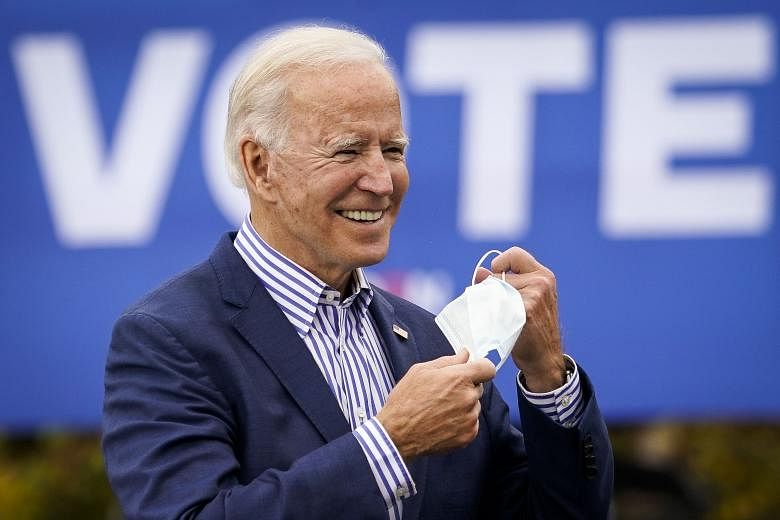WASHINGTON • Mr Joe Biden's US$2 trillion (S$2.72 trillion) plan to fight global warming is the most ambitious climate policy proposed by a leading presidential candidate, a political lightning rod spotlighted last Thursday night when the Democratic presidential nominee acknowledged during a debate that it would "transition" the country "from the oil industry".
But no one knows better than Mr Biden, a former vice-president, that it almost surely will not be enacted, even if his party secures the White House and the Senate. Thirty-six years in the Senate and the searing experience of watching the Obama administration's less ambitious climate plan die a decade ago have taught him the art of the possible.
Still, a president Biden could have real impact: solar panels and wind turbines spread across the United States' mountains and prairies, electric charging stations nearly as ubiquitous as petrol stations, and a gradual decrease in the nation's planet-warming greenhouse gas pollution.
"The oil industry pollutes significantly," Mr Biden said at the final presidential debate, adding: "It has to be replaced by renewable energy over time."
Mr Biden's advisers insist that climate change is not just a political slogan. And on Capitol Hill, his team is already strategising with Democratic leaders on how they can realistically turn at least some of those proposals into law.
"There are three things we have to do - climate, economic equality and democracy," said Senator Chuck Schumer, who would become the majority leader if the Democrats win control of the Senate. "All three are vital, and climate is not going to be the caboose."
If Mr Biden wins, he will face a dilemma he knows well - so much to do, and so little time.
As a newly inaugurated vice-president, he and then President Barack Obama dove first into passing an economic recovery Bill in the wake of the 2008 financial crisis, then focused on the Affordable Care Act. By the time Congress moved to climate change, the White House's political capital was exhausted.
Speaker Nancy Pelosi, a Democrat, had in 2010 forced the House to approve complicated legislation to cap carbon emissions, but that "cap and trade" Bill never even came to a vote in the Senate. Its passage in the House helped sweep Democrats from power months later.
"The biggest factor in not getting climate change done in 2010 was healthcare," said Mr Phil Schiliro, who was president Obama's liaison to Congress at the time. "And this could happen again, with the other things that have to come first. The coronavirus is such an enormous wild card."
If Mr Biden wins the White House but Republicans maintain their hold on the Senate, then the Democrat's loftiest climate pledges will certainly die. In that scenario, "all Biden can try to do is cobble back together the Obama environmental agenda", said Mr Douglas Brinkley, a historian who focuses on presidents' environmental legacies.
That would include, he said, rejoining the international Paris accord - the agreement between nations to fight climate change, which President Donald Trump is withdrawing from - and reinstating Obama-era climate regulations. And with a 6-3 conservative majority on the Supreme Court, even that could be thwarted.
But even a narrow Democratic majority in the Senate would leave a president Biden with options. And this time around, Mr Biden wants to do it differently, not with a stand-alone climate Bill but by tucking climate measures into broader, popular legislation to insulate them from partisan attack.
NYTIMES

